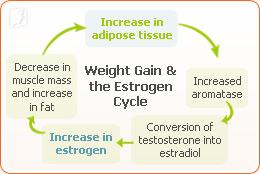As a result of fluctuating hormone levels, women are more susceptible to weight gain during menopause. Awareness and lifestyle are key factors in weight management and can help women avoid excess weight gain and associated risks. Obesity may lead to health complications such as cardiovascular disease, diabetes, and cancer. It is important for women to balance their hormones and be conscious of other potential causes of weight gain.
Weight Gain and Menopause

As a woman enters menopause, she becomes more susceptible to weight gain, particularly around the midsection. Weight gain is often attributed to declining and fluctuating estrogen levels, but not only estrogen levels fluctuate during menopause; testosterone levels shift as well. Because testosterone regulates how body fat is stored, a woman may notice weight gain around the midsection, even if her diet and exercise habits have not changed. This could be a result of imbalanced testosterone.
There are many other reasons a woman may experience sudden weight gain during menopause.
Other Causes of Weight Gain
Hormonal changes tend to be the main cause of weight gain during menopause, but it's important to be aware of other reasons you might be putting on a few extra pounds.
Other causes of weight gain include:
Poor diet
Women whose diets are high in fat and sugar, or those who don't consume enough vitamins and minerals, will inevitably gain weight. Avoiding fried foods instead replacing them with lean protein, fruits, vegetables, whole grains, and healthy oils is essential. Your metabolism will also change during menopause, so you may not need to eat as many calories as you did before.
Insufficient exercise

The way you treat your body directly affects your physical and emotional well-being. Women with sedentary lifestyles can gain weight, which may exacerbate menopausal symptoms.
Quitting bad habits and incorporating a daily exercise routine are two of the easiest, cheapest, most effective ways to balance hormones and improve overall health.
Thyroid disease
Women who suffer from hypothyroidism - an underproduction of hormones in the thyroid - may experience sudden and rapid weight gain. This disorder is often accompanied by other symptoms that appear similar to menopause symptoms, such as menstrual irregularities and fatigue.
For More Information
While menopausal weight gain may feel out of your control at times, there are ways you can adjust your lifestyle to balance hormones and maintain a healthy body. If you are concerned about sudden weight gain or other severe symptoms, it's always a good idea to talk to your doctor.
Click on the links below to learn more about weight gain treatments during menopause.
Sources
- Freeman, E.W. et al. (2010). Obesity and Reproductive Hormone Levels in the Transition to Menopause. Menopause, 17(4), 718-726. doi: 10.1097/gme.0b013e3181cec85d
- Love, S. (2003). Menopause and Hormone Book. New York: Three Rivers Press.



